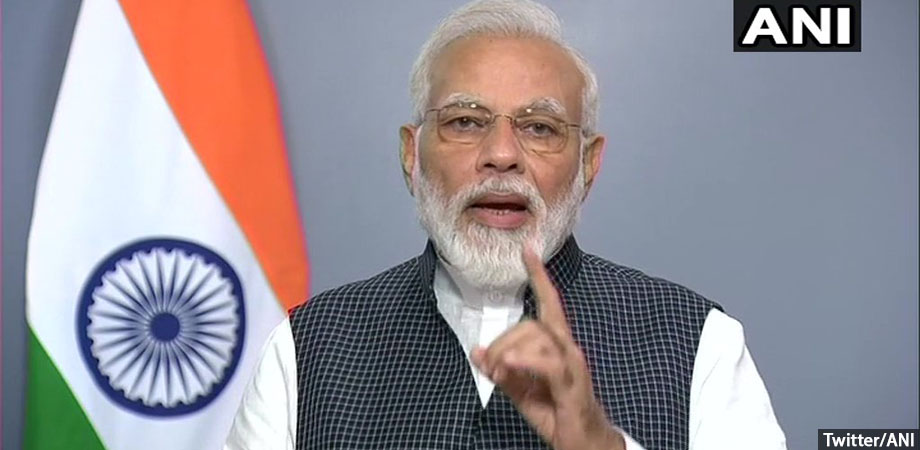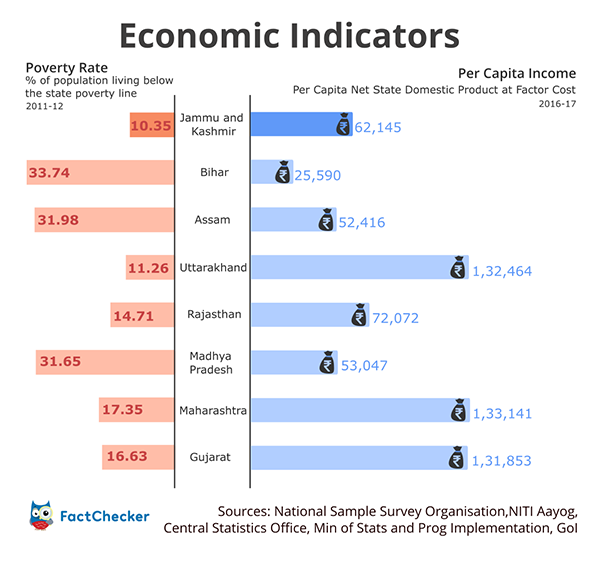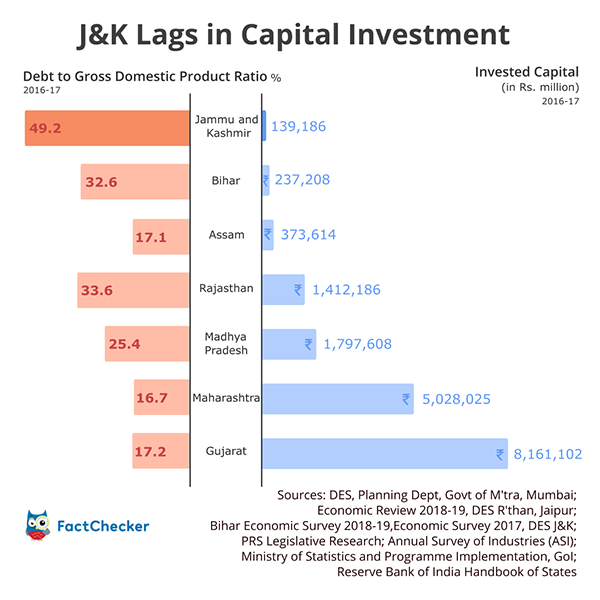PM Modi’s Speech On J&K: 4 Claims True, 4 False, 3 Partly True

Jaipur: In a speech after the amendment of Article 370, which removed the special status for Jammu and Kashmir (J&K), Prime Minister Narendra Modi said that several laws that apply in other parts of India have not applied in J&K, which has negatively affected development in the state.
“...a law because of which our brothers and sisters in Jammu and Kashmir were bereft of many of their rights, a law that was an obstacle to their development, has been removed,” Modi said in a televised speech, in Hindi, on August 8, 2019.
A FactChecker analysis shows that PM Modi is right on the applicability of laws, but some of J&K’s own laws have addressed the issue concerned, leading to better outcomes than the rest of the country. India’s Right to Education Act and the law to prevent child marriage were not applicable in J&K, but the state’s own law makes education up to 14 years free and compulsory, and its rate of underage marriage is lower than many other Indian states'.
J&K’s health and education indicators are better than in much of India, as we reported on August 8, 2019, though it lags behind on investment and economic growth.
Applicability of laws, its results: claim partly true
Article 370 did give the right to the J&K Assembly (state legislature) to not accept laws passed by the Indian parliament or laws enshrined in the Indian Constitution. But, since the 1950s, a number of Presidential orders have amended Article 370, making more and more laws applicable in J&K.
“By the Presidential Order of 1954, almost the entire Constitution (including most constitutional amendments) was extended to Jammu and Kashmir,” wrote Faizan Mustafa, vice-chancellor of NALSAR University of Law, Hyderabad, in The Indian Express on August 7, 2019.
Ninety-four of 97 entries in the Union List were applicable in J&K as in any other state. Two hundred and sixty of the 395 Articles of the Constitution were also extended to the state before the amendment of Article 370, Mustafa wrote.
Still, as many as 106 laws, including the Right to Education, Fifth Schedule laws that deal with land for Scheduled Tribes, and the Indian Penal Code (which replaces the Ranbir Penal Code in J&K), will become applicable in the state after the August 6, 2019, amendment to Article 370, home minister Amit Shah said in the Lok Sabha.
Poverty, social development: claims false
Contrary to PM Modi’s claims that the state did not develop because of Articles 370 and Article 35A, the state’s social development indicators are mostly better than the national average, from life expectancy to infant mortality, literacy and poverty, showed a FactChecker.in analysis of government data, published on August 8 2019.

Even without a law against child marriage, as PM Modi rightly said in his speech, fewer women in J&K were married as children when compared to other states. In 2015-16, 8.7% of J&K women between the ages of 20 and 24 years were married before the legal age of 18 years, compared to the national average of 26.8%, according to data from the National Family Health Survey IV. In Bihar, this figure was 42.5%, and in Gujarat 24.9%, data show.
These better development indicators are in part because of the state’s greater legislative freedoms under Article 370, wrote Haseeb Drabu, former finance minister of J&K, in Livemint on August 8, 2019. “It was the first state in India, much before the communist government in Kerala, to carry out non-compensatory land reforms,” he wrote, explaining that these “land reforms along with a massive debt write-off undertaken over 20 years, from 1951 to 1973, transformed the lives of rural masses and underlie J&K’s better-than national average human development indicators”.
Economic development: claims partly true
However, in terms of economic development, the state has fared poorly compared to the best performing states such as Maharashtra--its per capita gross domestic product (GDP) in 2016-17 was Rs 62,145, half of Maharashtra’s Rs 133,141--though it has done significantly better than poor performers such as Bihar (per capita GDP Rs 25,950).
J&K has lagged in private investment, attracting less than even Bihar, but experts differ on whether this was due to Article 370 or the uncertain security situation in the conflict-ridden state.

The state has high debt, as Modi said in his speech, and a dependence on the central government for funds. But this dependence is similar to several northeastern states’, which are challenged by geography, and were the focus of secessionist movements in the past.
In the period from 2011 to 2019, 54% of the revenue that J&K received from the central government was in the form of grants, which is higher than what other developed states such as Maharashtra or Gujarat received, but comparable to the northeastern states such as Mizoram (61%) and Nagaland (67%), based on research on state budgets by PRS Legislative Research.
Push to industry: claim false
After the amendment to Articles 370 and 35A, “public sector units of the central government and big private sector companies would also be encouraged to provide new employment opportunities”, PM Modi said in his speech.
There are 339 central public sector enterprises in India, having investments of Rs 23 trillion and employing 1.08 million people as of March 31, 2018. Of these, only three are in J&K, and have invested Rs 165 crore and employ 21 people, Drabu wrote in the Mint article mentioned above.
“The government of India and its companies face no Article 35A barriers; then why is it that in the last 70 years, there has practically been zero public corporate investment in J&K?,” Drabu wrote, “The fact is that the government of India has not invested growth capital in J&K for private corporate investment to venture into.”
SC/ST Act applicability: claim true
The Prime Minister was correct in claiming that the Scheduled Castes and Tribes (Prevention of Atrocities) Act, 1989, did not apply in Jammu and Kashmir. After the gang rape and murder of a child from a scheduled tribe in Kathua in southern J&K, groups within J&K and the National Commission for Scheduled Tribes had asked for the law to be made applicable in the state, The New Indian Express reported on June 3, 2018. With the amendment of Article 370, this Act will now be applicable in J&K.
The law for reserving seats in the state assembly for scheduled castes and tribes was not applicable in J&K, though the J&K assembly had passed a law on reservation in education institutes in 2004.
Rights of safai karamcharis: claim true
The National Commission for Safai Karamchari Act, 1993, enacted for the rehabilitation and protection of the rights of safai karamcharis (cleaners), did not cover J&K.
The state had invited sweepers from the Valmiki (Dalit) community in 1957 and granted them permanent residency if they continued work as sweepers, The Wire reported in June 2019. This effectively made them and their children ineligible for other state government jobs or liable to lose permanent residency.
In March 2019, safai karamcharis had moved the Supreme Court against Article 35A, which allowed the state of J&K to define permanent residents.
Right to education: claim partly true
As stated before, J&K’s own education law makes education up to 14 years free and compulsory.
It does not make education a fundamental right, and does not provide for reservation of 25% of seats for the poor in private schools. Yet the state fared slightly better than the rest of India in gross enrolment in senior secondary schools (students enrolled in Classes 11 and 12 as a proportion of all children of that age) in 2015-16--it reported 58.6%, compared to the all-India average of 56.6%, as per data from the Ministry of Human Resource Development.
Article 370 caused conflict: claim false
“Brothers and sisters, Article 370 and 35A gave Jammu and Kashmir nothing other than separateism, terrorism, dynastic politics, and corrruption. Pakistan was using these articles as a weapon to instigate people against the country. Because of this about 42,000 innocent people lost their lives, Jammu and Kashmir and Ladakh could not develop fast…” Modi said in his speech.
A May 2002 Ministry of External Affairs fact-sheet on J&K does not mention Article 370 as a reason for separatism and terrorism in the state. “Pakistan has always sought to use deniable violence to achieve its objective of wresting Jammu and Kashmir from India,” it said. The fact-sheet blamed militants and Pakistan-sponsored terrorism for the destruction of lives, property, and law and order in the state, and not Article 370.
“Militancy in J&K claimed over 40,997 lives over 27 years, an average of 4 deaths per day in the state until March 2017,” according to data from the Indian government. The casualties include 13,946 civilians, 5,053 security personnel and 21,998 militants between 1990 and March 2017, data show.
Casualties increased after 2015, when the Bharatiya Janata Party and the People’s Democratic Party formed a government in the state. Over 800 terror incidents were reported in J&K over the three years ending 2017--up from 208 in 2015 to 342 in 2017--according to an IndiaSpend analysis of government data published in June 2018. The state saw the most terror incidents in 2017 since 2010, which saw 488 incidents.
Right to vote: claim true
“There have been thousands of brothers and sisters living for decades in Jammu and Kashmir who had the right to cast their vote in Lok Sabha polls but were not allowed to vote in assembly and local body elections. They are the ones who had come to India following partition in 1947,” Modi said in his speech. He was referring to the refugees from West Pakistan, who came to J&K following Partition and were allowed to vote in parliamentary elections but not in state assembly elections in J&K.
“There are 32,000 PoK refugee families and 20,000 West Pakistani refugee families living in Jammu and Kashmir,” and only refugees from Pakistan-occupied Kashmir have the right to vote for both assembly elections and parliamentary elections, reported NDTV in November 2017.
Minority rights: claim true
The National Commission for Minorities Act 1992, not applicable in J&K, was meant to protect the rights and monitor the conditions of minorities in the country. The Jammu Kashmir Social Welfare department provides scholarships and other assistance to the Scheduled Castes and other social groups in need of assistance.
Since non-Muslims are in minority (31.7% of the population) in the state, the J&K government said in a January 2018 meeting, before the amendment of Article 370, that it would consider setting up a state minorities commission, as reported in The Times of India. But the alliance between the BJP and PDP broke, and the central government instituted President’s rule in the state before such a committee could be formed.
Rights of government employees, minimum wages: claim false
Central government employees in J&K have had the same concessions and privileges as applicable in the rest of the country at least since 2018, and the amendment of Article 370 does not have a relationship with a change in their status, as claimed by PM Modi. The Jammu and Kashmir Police Welfare Schemes include provisions for medical treatment, education of their children and insurance cover among other things, contrary to Modi’s claims.
The Prime Minister also said that the Minimum Wages Act existed only on paper in J&K. It is unclear what he meant by this. The Minimum Wages Act, 1948, is applicable in J&K, and was amended in 2017 to make the minimum wage Rs 225 a day for unskilled labour, Rs 350 for skilled, Rs 400 for highly skilled, and Rs 325 for administration and account staff. Different states in India have their own minimum wages.
(Khaitan is a writer and editor with IndiaSpend and FactChecker. Nushaiba Iqbal, an intern with IndiaSpend, provided inputs for this article.)
We welcome feedback. Please write to respond@indiaspend.org. We reserve the right to edit responses for language and grammar.



